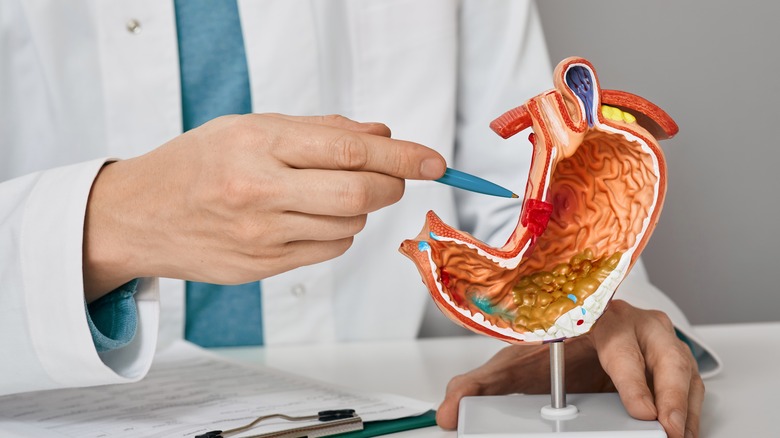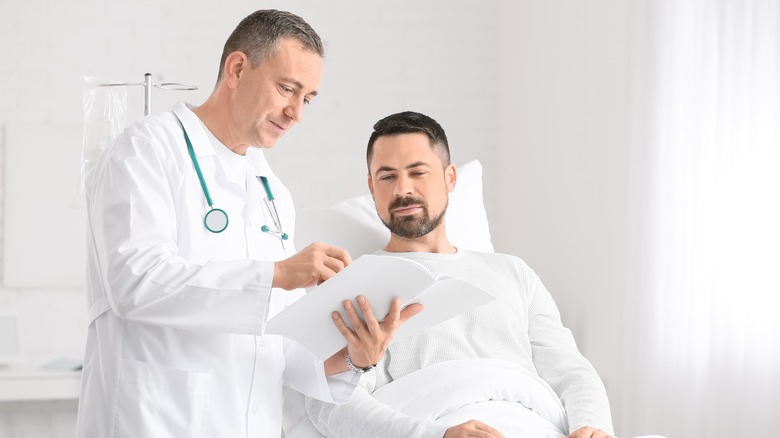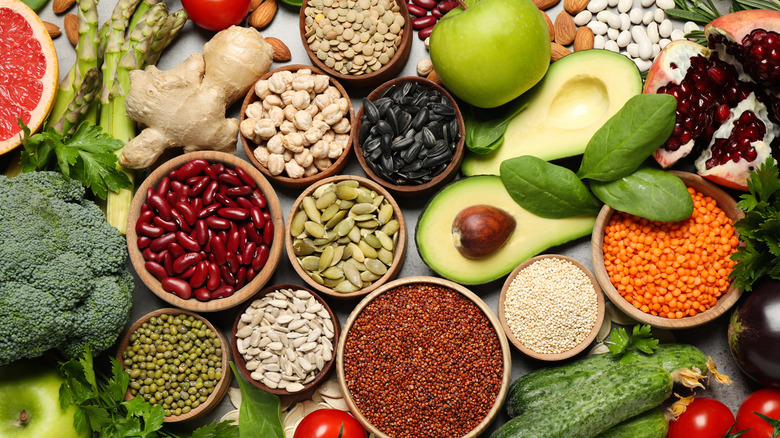Warning Signs From Your Stomach That You Shouldn't Ignore
The American Cancer Society writes that cancer occurs when the body's cells begin to grow out of control. It can happen in just about any part of the body and spread to other areas. When it grows in the stomach it is known as stomach cancer, or gastric cancer.
According to the National Organization for Rare Disorders (NORD), the most common type of stomach cancer is adenocarcinoma, which typically affects the lining of the stomach's mucus-producing cells. About 90 to 95% of people with stomach cancer have this type. The remainder will have primary gastric lymphoma, gastrointestinal stromal tumor, neuroendocrine tumors, or other types of cancer.
Scientists don't know exactly what causes stomach cancer, although WebMD notes that it may be linked to smoking; obesity; eating smoky, pickled, or salty foods; drinking alcohol; stomach surgery for ulcers; type-A blood; infection with the Epstein-Barr virus; asbestos; working in certain industries; having a family history of stomach cancer; and genetic factors.
Stomach cancer symptoms can be tricky
It's entirely normal to get a stomach ache sometimes. There can be many relatively mild causes of abdominal pain, including gas pains, diarrhea, or constipation, according to Healthline. However, there can also be more serious causes, like gallstones, a burst appendix, or kidney stones. If you are feeling stomach pain, especially if the pain is severe, it might also raise thoughts in your mind that perhaps you have cancer.
In some cases, pain and discomfort in the stomach can be an early sign of stomach cancer, according to the American Cancer Society. But generally speaking, the signs of stomach cancer can be deceptive and may be so vague that they don't really raise the suspicion that something is wrong, notes Cleveland Clinic. Unfortunately, this means that people are often not diagnosed until the later stages. This makes it important to be aware of stomach cancer's early warning signs.
Warning signs of stomach cancer
The Cleveland Clinic writes that one warning sign of stomach cancer is bloating. Fluid can build up in the abdomen, making the stomach feel tight or swollen. This can also make you feel full, even after you've only eaten a little bit of food.
They further explain that a cancerous growth could block the stomach, causing food to back up into the esophagus, leading to heartburn. While heartburn is common, especially after eating spicy foods, it might be a sign of trouble if it doesn't go away or medications don't seem to be helping. This blockage could also lead to nausea and vomiting since the food isn't able to easily pass through the digestive tract. Sometimes people may lose weight since they may feel too sick or bloated to eat much.
People with stomach cancer may also have blood in their bowel movements or vomit. This could show up as very dark stool, but there may not be any noticeable changes if it is a slow bleed. Regardless, blood loss can cause a person to develop anemia, and along with weight loss, can make people feel very tired.
The American Cancer Society adds that some people with stomach cancer may experience yellowing of the skin and eyes.
Finally, people may just have a general feeling that something isn't right. They may feel uncomfortable, heavy, or bloated, but aren't quite sure why.
When you should see a doctor
The American Cancer Society (ACS) explains that stomach cancer screening is not routinely done in the United States. When that is coupled with the fact that early symptoms can be so vague or even nonexistent, it means that stomach cancers are often not detected until they have grown large or have already spread. This makes it important to mention to your doctor when you have any of the potential early warning signs.
The ACS clarifies that, while these symptoms are more likely to be caused by other conditions, cancer can't be ruled out without a proper evaluation. In particular, they recommend that if your symptoms are not going away or they are becoming worse, you should bring them up with your physician.
According to the Mayo Clinic, your doctor can do testing by inserting a tiny camera into your stomach to look for any signs of cancer. They might also remove a sample of tissue to perform a biopsy if they spot any suspicious areas. Additionally, imaging tests like CT scans and a type of X-ray called a barium swallow might be performed to look for signs of cancer.
How stomach cancer is treated
Cancer.net states that treatment depends on the stage of the cancer. If it is detected early, the tumor can be removed endoscopically. If the cancer is further along, it may be necessary to remove part of the stomach and nearby lymph nodes. When the cancer has spread to the outer wall of the stomach and possibly the lymph nodes, your surgeon may decide to completely remove the stomach.
When the cancer has spread, you might also receive chemotherapy or radiation therapy. Radiation therapy involves using X-rays or other types of energy to kill cancer cells, says the Mayo Clinic. It might be before surgery to shrink the tumor or after to make certain that any missed cancer cells are destroyed. MedlinePlus explains that chemotherapy uses medications to kill cancer cells, slow their growth, or stop them from spreading. It might be used in combination with radiation therapy.
According to Cancer Treatment Centers of America, targeted therapy is a more precise treatment. Unlike chemotherapy, which targets any rapidly-growing cells, this type of therapy focuses on features unique to cancer cells. Cancer.net says there are two types that are used for stomach cancers: therapy that targets excess production of human epidermal growth factor receptor 2 (HER2) and therapy aimed at stopping angiogenesis (the making of new blood vessels).
Finally, there is immunotherapy which can boost or change how the immune system works in order to help it fight off cancer, per the Cancer Research Institute.
Preventing stomach cancer before it starts
Needless to say, it is best to stop cancer before it even starts. WebMD lists six steps you can take to help prevent stomach cancer.
Firstly, they recommend keeping an eye out for ulcers. They explain that a common type of bacteria called H. pylori can infect the stomach, causing ulcers. It is also a known carcinogen, so it is important to get ulcers diagnosed and treated.
They suggest that eating lots of vegetables and fruits — especially citrus fruits — may also be helpful in preventing stomach cancer. They say that you should choose fish, poultry, or beans as your protein source rather than red or processed meats. Whole grains are also a good food choice. They note that foods containing a lot of salt and preservatives should be avoided. They can harm the stomach lining.
Additionally, they advise quitting smoking. While smoking is often thought of in connection with lung cancer, it can put you at greater risk for stomach cancer as well.
Finally, they say to be sure to get plenty of exercise. This can reduce your risk for cancer and many other health issues as well.






